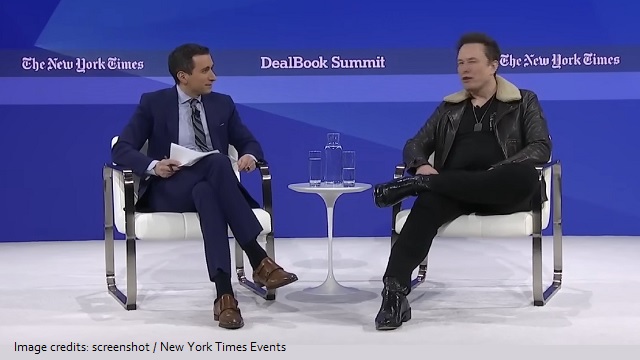The Elon Musk Interview that Nearly Broke the Internet

The prestige press has its knickers in a twist over Elon Musk’s interview at the annual DealBook Summit in New York City last week — an interview that nearly broke the internet.
Lasting an hour and a half in total, it was five minutes of the tech tycoon’s interchange with New York Times journalist Andrew Ross Sorkin that really got newsrooms up in arms, in which Musk told the corporations staging a boycott against X (formerly Twitter) to “go f*** yourself.”
And no wonder they are upset: the industry pushing the boycott hardest is the corporate press, with behemoth media conglomerates Comcast, Disney and Warner Bros. Discovery, along with cable networks NBC and CBS, leading the charge against Musk’s free speech platform.
“If somebody’s going to try to blackmail me with advertising, blackmail me with money, go f*** yourself,” Musk told a stunned audience at Manhattan’s Lincoln Centre.
“Is that clear? I hope it is,” he said, adding, “Hey, Bob, if you’re in the audience,” in a taunt aimed at Disney CEO Bob Iger.
Talk about poking the bear.
Why no advertiser boycott, Bob Eiger? You are endorsing this material! https://t.co/EVza5VZeSa
— Elon Musk (@elonmusk) December 7, 2023
The X boycott picked up steam after left-wing media “watchdog” Media Matters published a hit piece against the platform last month claiming that X was placing ads for major corporations alongside Nazi-related content.
It was later revealed that Media Matters had deliberately curated its X feed to find rare instances of ads being placed next to the unsavoury content, while portraying such scenarios as commonplace for users.
In response, Musk filed a “thermonuclear” defamation lawsuit against Media Matters, arguing the company had acted deceptively in order to “drive advertisers from the platform and destroy X Corp”.
Claims that X represents a particular haven for antisemitism have been undermined by a recent survey showing that both TikTok and Instagram are much more likely to influence users towards antisemitic views.
Spending 30 minutes a day on TikTok increases the chances somebody holds antisemitic or anti-Israel views by 17 percent, in comparison with 6 percent for Instagram and 2 percent for X, according to the survey’s findings.
A new survey suggests TikTok is a meaningful driver of a surge in antisemitism. #TikToxic
Spending at least 30 minutes a day on TikTok increases the chances a respondent holds antisemitic or anti-Israel views by 17% (compared with 6% for Instagram and 2% for X). pic.twitter.com/5rTbuoqKlR
— Anthony Goldbloom (@antgoldbloom) November 30, 2023
Indeed, the recent focus on antisemitic content on X provides more pretext than context for the establishment’s fiery wrath against Elon Musk.
Shortly after purchasing the platform, the new CEO levelled the editorial playing field by removing corporate journalists’ once-privileged identifying checkmarks, instead offering the blue badge to paying subscribers.
Musk also worked closely with exiled journalists Matt Taibbi and Bari Weiss on the Twitter Files to expose corruption in the media and US intelligence communities that saw the 2020 presidential election tipped in Joe Biden’s favour.
He has likewise overseen a substantial rewrite of Twitter’s user rules to better differentiate hateful conduct from honest dissent and introduced the “Community Notes” feature which allows X users to collaboratively fact-check news content — both moves that have angered woke gatekeepers.
While Twitter was once the platform of choice among corporate journalists, Musk has effectively pried it free of the establishment media’s stranglehold, allowing entrenched narratives to be challenged and information to flow freely — which surely always were some of the internet’s most redeeming features.
Far from being a kind of final-straw response to Elon Musk from an exasperated establishment, the recent boycott of X is only the latest in a long series of mainstream missives aimed at punishing the billionaire for his defence of free speech.
Since Musk bought X, the Securities and Exchange Commission (SEC) has sued him over the purchase; the Federal Trade Commission has demanded internal X documents; Biden’s Department of Justice (DOJ) has sued SpaceX for not hiring refugees to work on its secret rocket technology; the DOJ and SEC have opened investigations against Tesla over an alleged misuse of funds to build a glass house; the DOJ has opened a criminal investigation against Tesla over its self-driving cars; and the Equal Employment Opportunity Commission has sued Tesla over alleged workplace harassment.
Is all of it just coincidence? Or payback?
Of course, billionaires shouldn’t be exempt from accountability. But nor should defenders of free speech be driven into the ground by the powers that be simply for defending free speech.
For me, the most powerful words of Musk’s interview were not his expletives, which I personally found distasteful.
They were the following: “What I see all over the place is people who care about looking good while doing evil.”
Feigning outrage at antisemitism on X while turning a blind eye to it on other platforms? Claiming to care about the truth while launching an all-out attack on one of its staunchest defenders?
There could hardly be better examples of “looking good while doing evil”.
With friends like those, Elon hardly needs enemies, and he likely is better off without them.
AUTHOR
KURT MAHLBURG
Kurt Mahlburg is a writer and author, and an emerging Australian voice on culture and the Christian faith. He has a passion for both the philosophical and the personal, drawing on his background as a graduate architect, a primary school teacher, a missionary, and a young adult pastor.
EDITORS NOTE: This MERCATOR column is republished with permission. ©All rights reserved.


Leave a Reply
Want to join the discussion?Feel free to contribute!